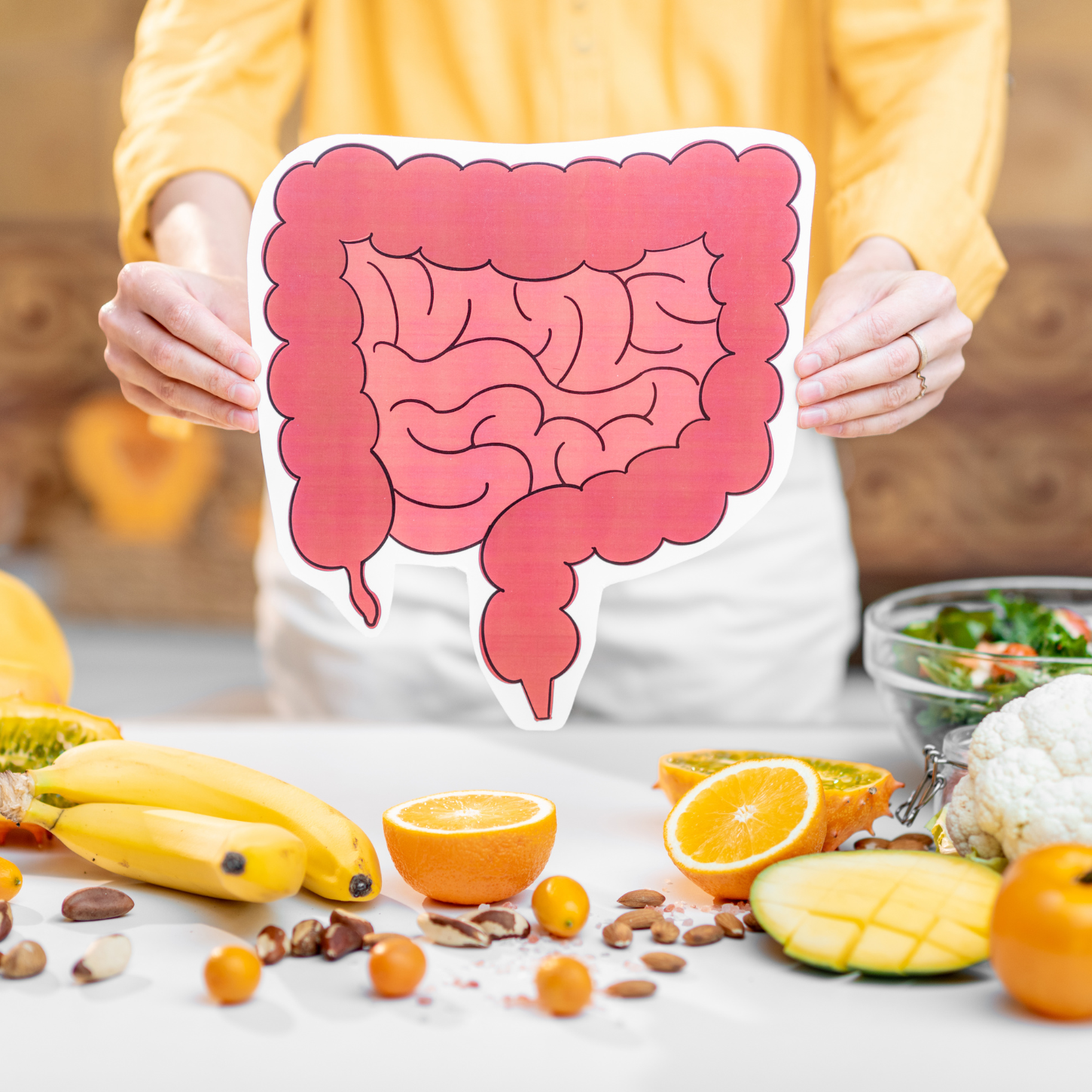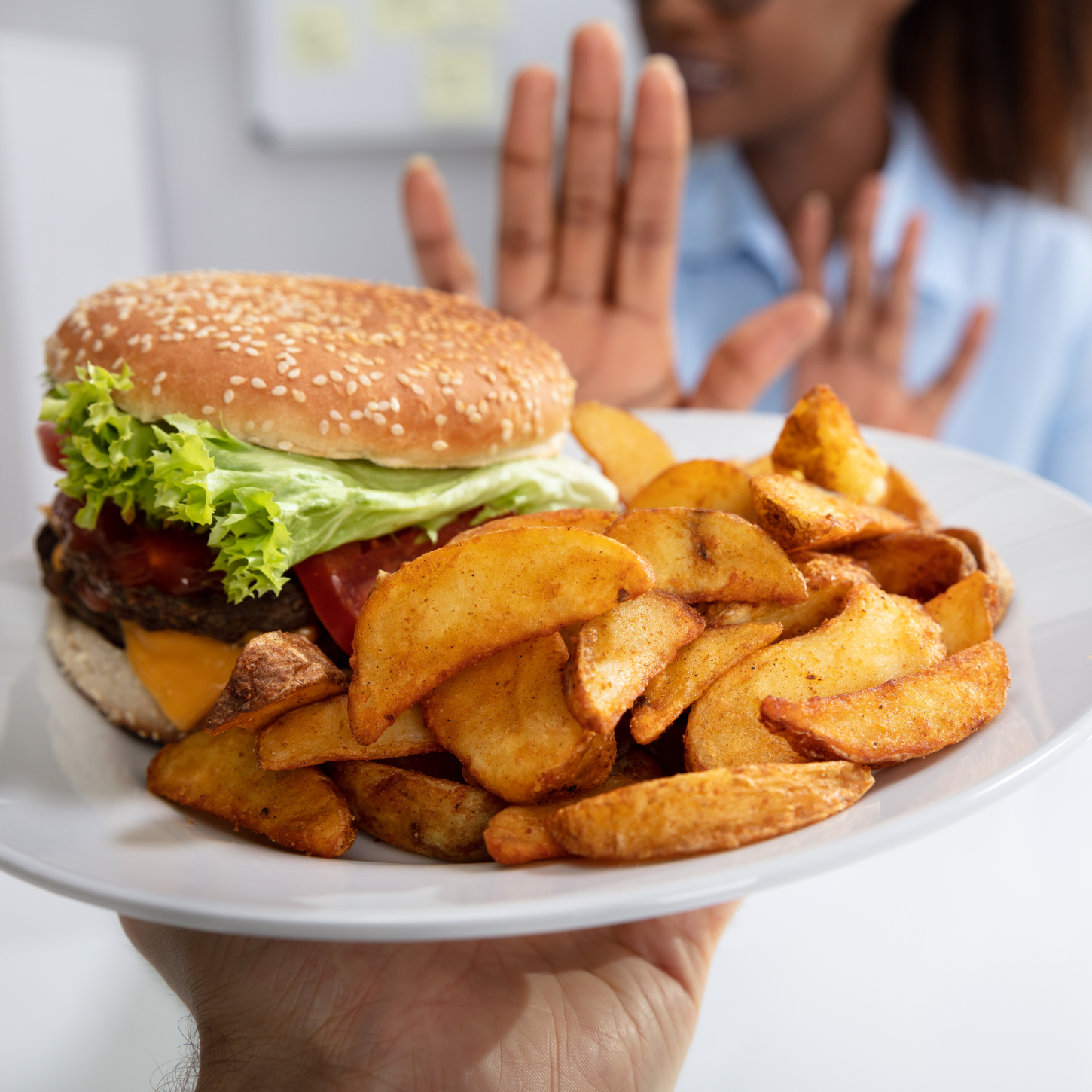Are you tired of feeling like a human balloon, ready to pop at any moment? Do you find yourself secretly unbuttoning your pants under the table after a meal, praying that no one notices?
Well, my friend, you're not alone. Bloating is the uninvited guest that crashes our digestive party, leaving us feeling uncomfortable, sluggish, and downright frustrated.
Bloating may seem like a trivial annoyance, however, when left unchecked, bloating can not only cause physical discomfort but also impact our mental and emotional health, leading to feelings of self-consciousness and irritability.
In this blog, we'll dive deep into the mysterious world of bloating, exploring its sneaky causes and, most importantly, how to get rid of it from your life for good. So, buckle up (or should I say, unbutton?), and let's embark on this gas-busting journey together!
Table of Contents:
The Importance of Your Digestive Health
Your digestive system is the cornerstone of your overall health. It enables you to break down and absorb crucial nutrients that are essential for the proper functioning of every part of your body. Without these nutrients, you cannot produce the neurotransmitters, hormones, and cells that your body needs to operate optimally.
Your diet provides you with the crucial B vitamins that are essential for good mood and hormonal balance. Dietary fats and cholesterol form the basis of your hormones; a deficiency in these can throw off the balance of your hormones. Additionally, your thyroid function and metabolism rely on specific minerals that you should obtain from food.
Unfortunately, you may be one of the many people who experience digestive issues that hinder their body's ability to extract the required nutrients from their food. Whether it is due to a disease like inflammatory bowel disease or indigestion, even the healthiest of diets may not provide optimal nutrition if the digestive system is compromised.
What is Bloating?
Bloating is one of the common symptoms you may experience that tells you that your digestive system is out of whack.
Picture this: your digestive system is like a bustling, well-oiled machine, breaking down the food you consume into essential nutrients and energy. However, sometimes this machine encounters a hiccup, causing gas to build up in your stomach and intestines. This gas accumulation is the culprit behind that inflated, tight sensation we know as bloating. 
What Causes Bloating?
Most of us can relate to the symptom of bloating, but it’s important to recognise that bloating is just that…a symptom. A little gas is a normal by-product of digestion. However, excessive gas production can result from various factors.
So, the first step is to get to the bottom of your bloating! Understanding the underlying causes enables you to efficiently deflate your gut and restore balance within your body's inner workings.
Bloating is commonly attributed to three primary concerns: digestive dysfunction, hormonal dysregulation, and psychological stress.
1. Digestive dysfunction
If your bloating occurs following meals, or if you wake with a flat stomach in the morning but feel like you're about to give birth by bedtime, it could be related to your digestion.
- Low stomach acid or digestive enzymes: To effectively digest and absorb the micronutrients in your food, your stomach needs to be acidic. When it's not, the food ferments in your gut, creating some not-so-pleasant symptoms like gas, bloating, and even changes in your stool. You also need a healthy production of digestive enzymes to be able to break down your food properly.
- Food intolerances: Just like any other inflammatory reaction, food intolerances trigger inflammation in your gut, causing fluid retention and, ultimately, bloating. For example, people who are lactose intolerant may find themselves particularly prone to these sorts of issues due to their inability to digest common dairy products, which contain high levels of the carbohydrate lactose; while beans (specifically raffinose) are also known to trigger these unwanted gastrointestinal symptoms. Other major food triggers include fried, fatty or spicy foods, broccoli, onion, cabbage, dried fruits, anything containing sorbitol, mannitol, or maltitol, apple and prune juice, and carbonated beverages.
- Eating behaviours: Eating behaviors can also lead to gas production. These include:
- Talking while eating
- Eating when stressed
- Smoking or chewing tobacco
- Overeating
- Chewing gum
- Dysbiosis: Bloating could also be due to an overgrowth of bacteria and yeast in your stomach (aka dysbiosis). Even sterile environments like the small intestine aren't immune to bacterial overgrowth, a condition known as small intestinal bacterial overgrowth (SIBO). In fact, misdiagnosed SIBO could be the culprit behind up to 78% of IBS cases.
2. Hormonal dysregulation
Ladies, if you're waking up looking like you swallowed a watermelon, even though you didn't overindulge the night before, or you notice a monthly trend with your bloating, your hormones may be to blame.
- Excess estrogen: Breast tenderness, water retention, and bloating may all be indicators that there is too much estrogen in the body. Bloating that never resolves can also be a sign of ovarian or uterine cysts, which should be investigated further.
-
Low progesterone: Low progesterone levels can also be a culprit of bloating, which typically starts two weeks before your flow and goes hand-in-hand with short cycles and long bleeding times. Progesterone is known for its calming effect, which is often referred to as the "pregnancy glow." However, if levels are low, premenstrual irritability and bloating may occur.

3. Psychological stress
Now, let's talk about a surprising yet significant cause of bloating: stress. Our mental state can have a direct impact on our gut- it's not just in our heads.
You see, our brain and gut are like best friends, constantly communicating through the gut-brain axis. When stress enters the scene, it can disrupt this friendly conversation, leading to digestive distress and, you guessed it, bloating.
In fact, there's a well-established link between irritable bowel syndrome (IBS) and psychological disorders, such as anxiety and depression. IBS, a common condition characterized by abdominal pain, bloating, and altered bowel habits, is often exacerbated by stress, creating a vicious cycle that can be challenging to break.
How to Fix Bloating Naturally
Dietary changes
First things first, let's talk portion sizes. Overeating can stretch your stomach beyond its comfort zone, leaving you feeling bloated and uncomfortable. The best rule is to eat until you’re 80% full. Then get up and go for a light walk.
If you struggle with digestive issues, grazing throughout the day may not be the best solution. Your digestive system needs a break sometimes! Rest assured, you can still maintain a healthy and balanced diet by opting for regular, moderate-sized meals with well-spaced breaks in between.
Don't forget to chew, chew, chew! Eating too quickly can cause you to swallow air, which can lead to—you guessed it—bloating. So, take your time, savor each bite, and give your digestive system a helping hand by breaking down your food thoroughly before swallowing.
Next up, let's discuss trigger foods. It can be helpful to keep a food diary to identify your personal triggers. Some common culprits behind bloating include gas-producing foods like beans, cruciferous veggies (think broccoli and cabbage), dairy, eggs, and carbonated beverages.
Even though these foods can be difficult to digest and cause gas, they shouldn't be eliminated altogether due to their high-fiber content that helps sustain good bowel regularity and feeds the beneficial bacteria in our microbiome. Therefore, it's worthwhile investing time into gradually increasing tolerance of these types of carbohydrates for the sake of optimal health! To find out more about how to overcome food intolerances, check out our blog here.
Speaking of gut-friendly options, let's give a warm welcome to our anti-bloating superstars! Foods rich in potassium, such as bananas, avocados, and sweet potatoes, can help counteract sodium-induced bloating.
Supplementing with probiotics or boosting probiotic foods in your diet can help reduce harmful bacteria that trigger digestive issues such as bloating. Probiotics act like policeman within the gut, restoring order and peace amongst the “citizens” of the microbiota. They keep the disease-promoting bacteria at minimal levels and promote the growth of beneficial bacteria. The more diversity they see in the community of microorganisms, the happier they’re going to be. Probiotic-rich foods include kombucha, kefir, sauerkraut, kimchi, miso, coconut yoghurt, tempeh and pickled vegetables. If considering taking probiotic supplements, the strains that assist immensely with bloating are Lactobacillus rhamnosus, Lactobacillus acidophilus, Lactobacillus plantarum and Bifidobacterium infantis.
And, of course, you can’t forget the prebiotic foods that act as sources of energy to help build and maintain the beneficial bacteria in your gut. Examples of prebiotics include Jerusalem artichoke, raw dandelion greens, raw chicory root, raw garlic, onion, leeks, asparagus, wheat bran, and banana.
Stay hydrated
While it may seem counterintuitive to drink more water when you're feeling puffed up, staying well-hydrated is crucial for maintaining a happy, deflated gut. Adequate hydration helps to keep your digestive system running smoothly, preventing constipation and ensuring that gas moves through your intestines more efficiently.
Additionally, water can help counteract sodium-induced bloating by flushing excess salt from your body. So, don't forget to keep that water bottle close by and aim for those recommended 8 glasses a day. Just be mindful to avoid carbonated beverages, as they can introduce extra gas into your system and exacerbate bloating.
Herbal remedies
Nature also offers us a variety of herbal remedies to pick from to help bust the bloat.
-
Peppermint
This aromatic herb is a popular choice for tackling bloating, thanks to its natural antispasmodic properties. Peppermint works by relaxing the smooth muscles in your gastrointestinal tract, helping to ease gas and discomfort. To reap the benefits of this relief remedy, simply steep 1-3 teaspoons of dried peppermint in hot water for 5-10 minutes and consume as needed, Alternatively, enteric-coated peppermint oil soft gels can be taken to carry the peppermint oil all the way to the intestines.
-
Ginger
This versatile root has been used for centuries to soothe digestive woes, including bloating. Ginger contains compounds called gingerols and shogaols, which help to stimulate digestion and relieve gas. To harness the power of ginger, you can either steep fresh ginger slices in hot water for a comforting tea or add grated ginger to your meals for an extra kick of flavor and gut-friendly benefits.
-
Fennel
This flavorful herb is a bloating-busting superstar, thanks to its carminative properties, which help to expel gas from your digestive system. Fennel also contains a compound called anethole, which has been shown to relax the muscles in your gastrointestinal tract, further easing bloating and discomfort. To enjoy fennel's gut-soothing magic, you can either chew on fennel seeds after a meal (or you can add 1 tsp to 1 tbsp of fennel seeds to a recipe), or steep them in hot water to create a delicious, fragrant tea.
-
Chamomile
Chamomile is an all-around powerhouse when it comes to relieving digestive issues like bloating and gas due to its anti-inflammatory and antispasmodic properties. Studies have also shown that chamomile can be effective against Helicobacter pylori bacteria - a common cause of stomach infections and bloat!
This dainty flower is also well-known for its relaxing effects, making it an excellent choice for alleviating stress-induced bloating. To indulge in a cup of calming chamomile tea, simply steep a chamomile tea bag or dried, whole chamomile flowers in hot water for 5-10 minutes.
-
Digestive enzymes
Digestive enzyme supplementation can help out when your enzymes are low or to target a specific deficiency. However, with so many enzyme supplements out there, it can be overwhelming to choose the right one for you. Plant-based enzymes like bromelain or papain are recommended as they help your digestive system break down food better and reduce bloating. And if you're dealing with low enzyme production, a combination supplement with a blend of multiple digestive enzymes is your best bet.
Stress management
Managing stress is crucial in your quest to alleviate bloating. Remember, our brain and gut are constantly communicating through the gut-brain axis, and when stress disrupts this connection, it can lead to digestive distress and bloating.
By incorporating stress management techniques on a daily basis, such as meditation, deep breathing exercises, gratitude journaling, or simply prioritizing self-care, you can nurture a healthier mind-gut relationship and keep bloating at bay. So, take a deep breath, embrace relaxation, and deflate that stress-inflated belly for a happier, more comfortable digestive journey.
Exercise
Engaging in regular physical activity not only keeps your body fit and healthy but also works wonders for your digestive system. Exercise stimulates the natural contractions of the intestinal muscles, helping to move gas through your system more efficiently and alleviate bloating.
Plus, physical activity is a great stress reliever. So, whether it's a brisk walk, a sweaty gym session, or a calming yoga practice, incorporating exercise into your daily routine can help deflate that pesky belly and promote a more harmonious digestive journey.
When to Seek Professional Help
Now, if you're experiencing persistent or severe bloating that doesn't improve with lifestyle changes and natural remedies, it's time to consult a healthcare professional.
Additionally, if your bloating is accompanied by other symptoms such as severe abdominal pain, unexplained weight loss, changes in bowel habits, or blood in your stool, it's crucial to seek medical advice, as these could indicate an underlying health issue.
That’s It, Folks!
And there you have it, fellow gut warriors! By embracing these natural remedies, lifestyle changes, and stress management techniques, you're well on your way to deflating that pesky belly and reclaiming your digestive comfort.
Remember, you have the power to take control of your gut health and overall well-being. So, let's bid farewell to bloat and embark on a happier, more harmonious digestive journey. Cheers to a healthier, deflated gut and a vibrant, thriving you!
Recipe Spotlight: Tropical Chia Pudding
Chia seeds are a great superfood for so many reasons!
- They’re packed with heart-healthy omega-3 fatty acids
- They’re a good source of plant-based protein
- They absorb 10 times their weight in liquid making them the ultimate hydrator
- They’re an excellent source of antioxidants, vitamins and minerals
We love chia pudding because it is so versatile, and it can be prepared with different fruit juices, plant-based milks, spices, nuts, seeds, granolas, and fruits. The possibilities are endless!















What Do You Think? Comment Below: